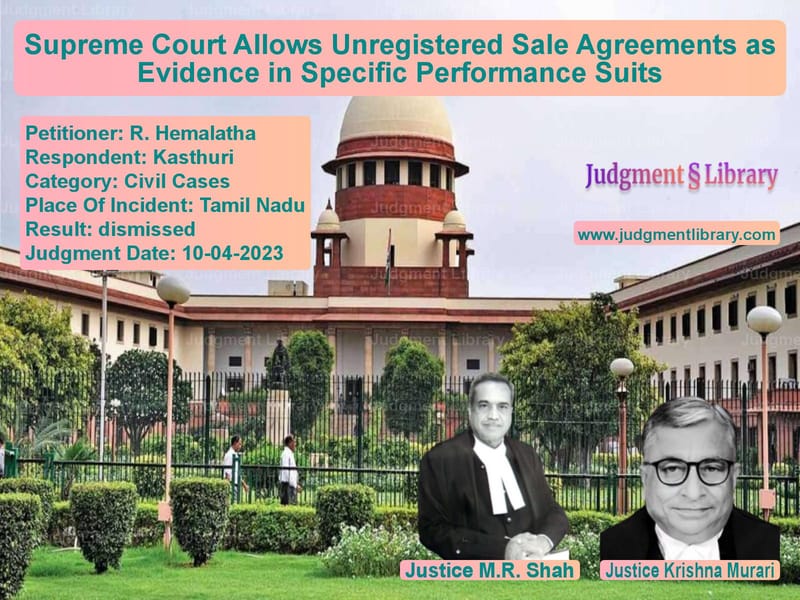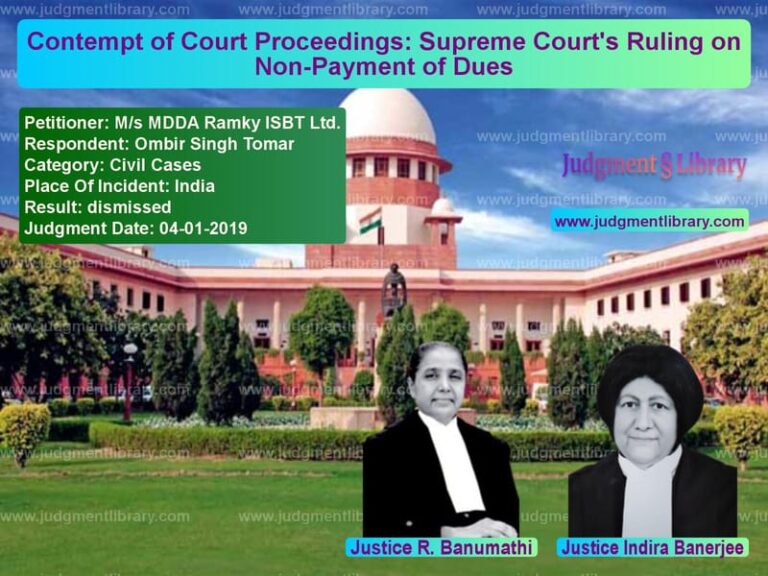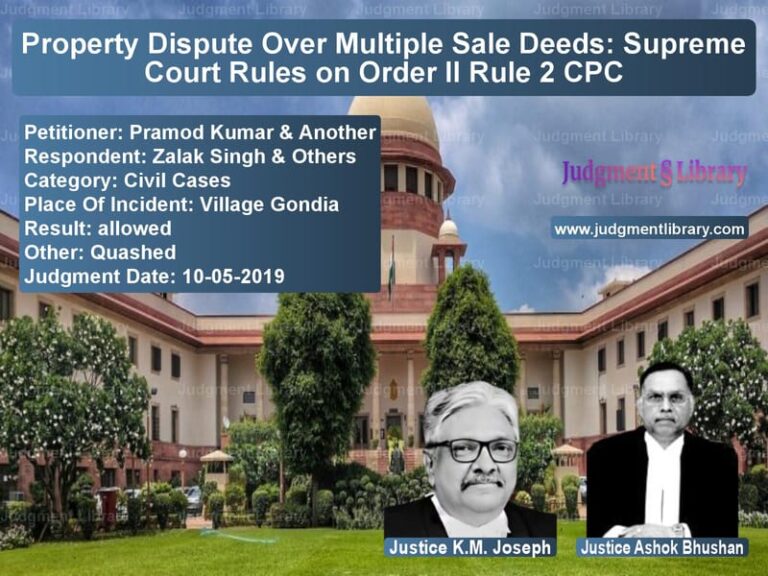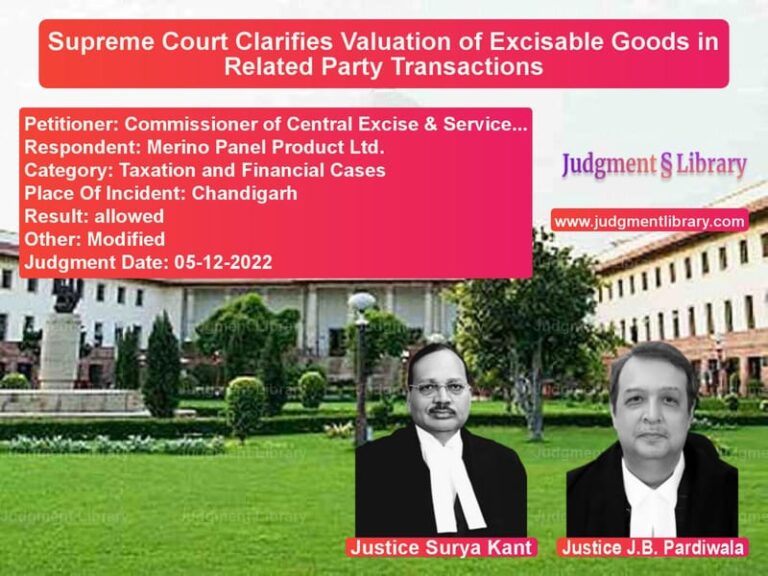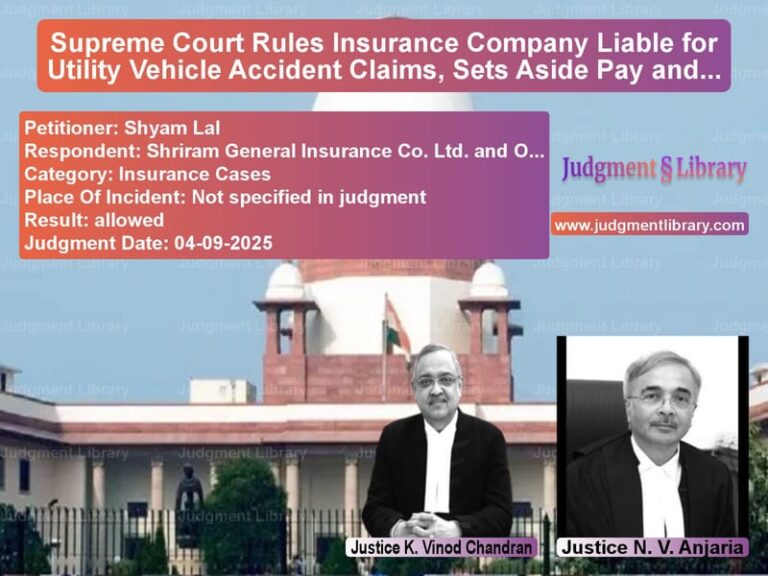Supreme Court Allows Unregistered Sale Agreements as Evidence in Specific Performance Suits
The Supreme Court of India, in its judgment dated April 10, 2023, in R. Hemalatha vs. Kasthuri, ruled that an unregistered agreement to sell can be admitted as evidence in a suit for specific performance. The ruling reaffirmed the interpretation of Section 49 of the Registration Act, which allows such documents to be used as evidence of a contract.
Background of the Case
The case originated from a dispute over the admissibility of an unregistered agreement to sell dated September 10, 2013. The respondent, Kasthuri, filed a suit for specific performance of this agreement. The appellant, R. Hemalatha, challenged the admissibility of the document, arguing that under the Tamil Nadu Amendment Act, 2012, such agreements were required to be registered and, therefore, could not be received in evidence.
The trial court ruled in favor of the appellant and held that the agreement was inadmissible. However, the Madras High Court reversed this decision, citing the proviso to Section 49 of the Registration Act, which permits an unregistered document affecting immovable property to be admitted as evidence in a suit for specific performance. The appellant then approached the Supreme Court.
Legal Issues
The primary legal question before the Supreme Court was:
- Whether an unregistered agreement to sell, which is compulsorily registrable under the Tamil Nadu Registration Amendment Act, 2012, can still be admitted as evidence in a suit for specific performance?
Arguments by the Appellant
The appellant, represented by legal counsel, contended:
- Under the Tamil Nadu Amendment Act, 2012, an agreement to sell involving immovable property valued at Rs. 100 or more must be registered.
- The trial court correctly ruled that the unregistered agreement was inadmissible.
- The High Court failed to consider the legislative intent behind making agreements to sell compulsorily registrable.
- The amendment effectively nullifies the exception in the proviso to Section 49 of the Registration Act.
Arguments by the Respondent
The respondent countered with the following points:
- The proviso to Section 49 of the Registration Act explicitly allows an unregistered agreement to be admitted as evidence in suits for specific performance.
- Despite the Tamil Nadu Amendment, there was no corresponding amendment to Section 49 restricting its application.
- The High Court correctly interpreted the law, ensuring that procedural requirements do not obstruct substantive justice.
Supreme Court’s Observations
The Supreme Court bench, comprising Justices M.R. Shah and Krishna Murari, made several key observations:
- “The Tamil Nadu Amendment Act, 2012, mandates registration of sale agreements but does not override the proviso to Section 49 of the Registration Act.”
- “The High Court rightly held that an unregistered sale agreement can be received as evidence of a contract in a suit for specific performance.”
- “The legislative intent behind the 2012 Amendment was to prevent loss of revenue due to unregistered transactions, not to prevent legitimate claims under specific performance.”
- “There has been no amendment to Section 49 restricting its applicability in cases of specific performance.”
Final Judgment
The Supreme Court ruled:
- The appeal was dismissed.
- The High Court’s order allowing the unregistered agreement as evidence was upheld.
- The trial court was directed to proceed with the suit for specific performance.
Implications of the Judgment
This ruling has far-reaching implications for real estate transactions and contract law:
- Protection for Buyers: The decision ensures that buyers can enforce agreements even if they are unregistered.
- Clarification on Registration Laws: The judgment clarifies that procedural requirements should not obstruct substantive justice.
- Judicial Interpretation of Amendments: The ruling confirms that state amendments to the Registration Act must be read in harmony with central provisions.
Conclusion
The Supreme Court’s ruling in R. Hemalatha vs. Kasthuri reaffirms the principle that substantive justice prevails over procedural technicalities. By allowing an unregistered sale agreement to be admitted as evidence in a suit for specific performance, the Court has provided clarity on the interplay between state and central laws governing property transactions.
Petitioner Name: R. Hemalatha.Respondent Name: Kasthuri.Judgment By: Justice M.R. Shah, Justice Krishna Murari.Place Of Incident: Tamil Nadu.Judgment Date: 10-04-2023.
Don’t miss out on the full details! Download the complete judgment in PDF format below and gain valuable insights instantly!
Download Judgment: r.-hemalatha-vs-kasthuri-supreme-court-of-india-judgment-dated-10-04-2023.pdf
Directly Download Judgment: Directly download this Judgment
See all petitions in Contract Disputes
See all petitions in Property Disputes
See all petitions in Specific Performance
See all petitions in Judgment by Mukeshkumar Rasikbhai Shah
See all petitions in Judgment by Krishna Murari
See all petitions in dismissed
See all petitions in supreme court of India judgments April 2023
See all petitions in 2023 judgments
See all posts in Civil Cases Category
See all allowed petitions in Civil Cases Category
See all Dismissed petitions in Civil Cases Category
See all partially allowed petitions in Civil Cases Category

